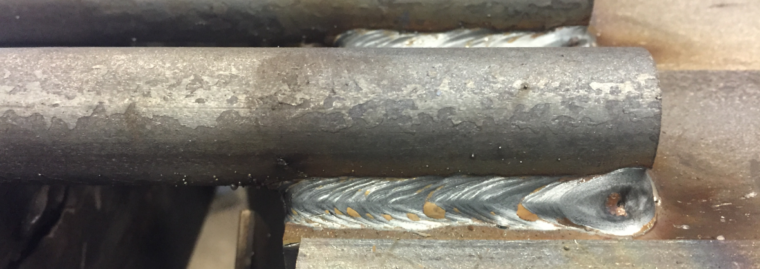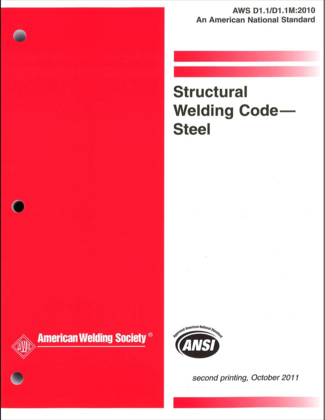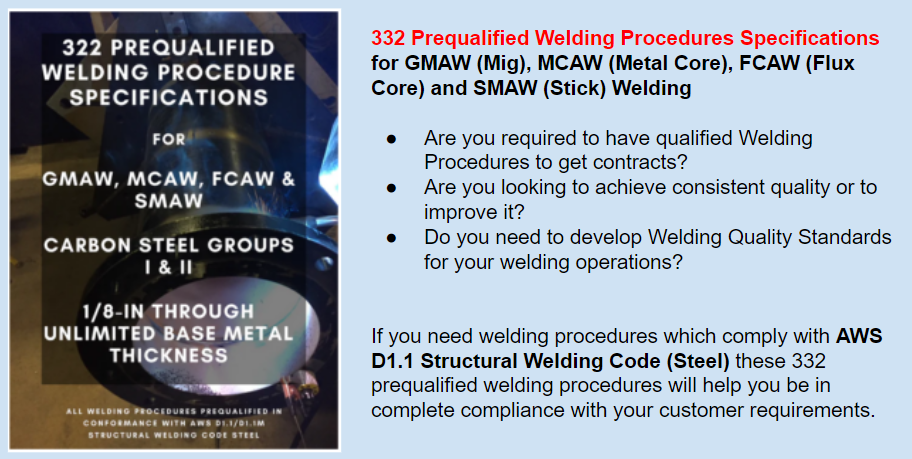
A prequalified welding procedures specification is a welding procedure that is exempt from the qualification tests required by a code or standard. Not all codes provide the user with the advantage of using prequalified welding procedures. Some that do are:
- AWS D1.1 Structural Welding Code – Steel
- AWS D1.3 Structural Welding Code – Sheet Steel
- AWS D1.6 Structural Welding Code – Stainless Steel
Other codes allow the use of Standard Welding Procedure Specifications (SWPSs). These are not to be confused with prequalified WPSs. SWPSs have been qualified by testing. The user has the option of purchasing these documents from the American Welding Society in order to forgo testing. Typically, they cover applications that cannot be prequalified by any code, such as shielded metal arc welding of chromium-molybdenum steels. For more on SPWS you can read What is a Standard Welding Procedure Specification.

AWS D1.1 Structural Welding Code (Steel) allows the use of prequalified welding procedure specifications
Prequalified WPSs are predominantly used when conformance to AWS D1.1 Structural Welding Code (Steel) is necessary. The advantages of using prequalified WPSs are significant. Some of these advantages are:
- Time – A prequalified WPS may be developed quickly as long as the requirements of the code are followed. Since there are no testing requirements the procedure can be used right away. No need to send test weldments out to get tested and wait several days for the results.
- Money – qualification tests can be expensive. A single PQR can cost anywhere between $1,000 and $3,000 depending on the level of testing required. Since prequalified WPS are exempt from testing the savings can be significant, especially when multiple welding procedures are required.
- Quality – the use of prequalified welding procedures can improve weld quality. The many requirements and limitations of prequalified WPSs are there to ensure that sound welds can be made. However, it is worth noting a prequalified WPS alone does not ensure weld quality. Welder performance should be tested in order to assure that the welder can take the welding procedure and make welds that pass the acceptance criteria.
- Code Compliance – prequalified WPS are written in conformance with the code that allows them. This means that when a contract requires qualified welding procedures the use of prequalified welding procedures is allowed provided that the applicable code allows it and that the company offering the contract does not prevent their use.
- Applicability – many times companies end up developing or paying someone to develop prequalified WPSs in order to meet the requirements of a contract. These prequalified WPS may be used on other jobs. Even on jobs that do not require qualified (or prequalified) procedures. Applying these procedures for all jobs typically will result in improvements to overall weld quality and decreased costs.
To develop and write a prequalified WPS you do not need to be a certified welding inspector (although this helps tremendously) or a welding engineer. You simply need to understand the requirements for prequalification imposed by the code.
Some, but not all of the requirements are:
- Using approved joint details
- Using filler metal manufacturer’s recommended parameters (amps, wire feed speed, volts, CTTWD)
- Only using processes allowed for prequalification (for example, short circuit transfer GMAW is not permitted)
- Adhering to maximum single pass fillet weld sizes
- Adhering to maximum root and fill pass thicknesses
- Adhering to minimum weld sizes for partial joint penetration (PJP) welds
- Using approved filler metals
- Using specified preheat and interpass temperature
- Specifying travel speeds
- Adhering to the tolerances specified in the prequalified joint details
- and many more..
Even seasoned “code experts” will at times miss certain requirements when writing prequalified welding procedure specifications. It is necessary to fully understand the requirements and limitations of the code.
And one more thing…never assume that because a WPS has been prequalified that it is optimized for productivity. Codes and standards are in place to assure quality, not to reduce costs. When using writing prequalified WPSs keep in mind that your deposition rates matter. Don’t settle for low depositions rates when higher ones can be used. More on this specific topic in future articles.


Please note: I reserve the right to delete comments that are offensive or off-topic.